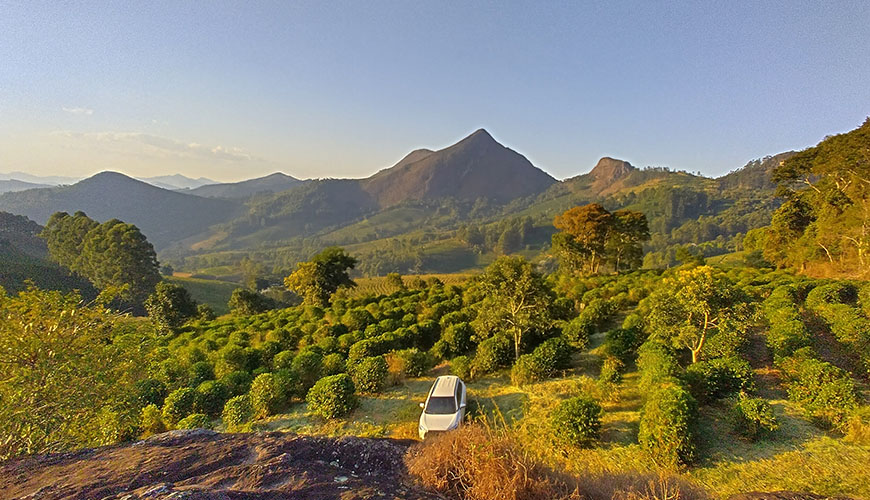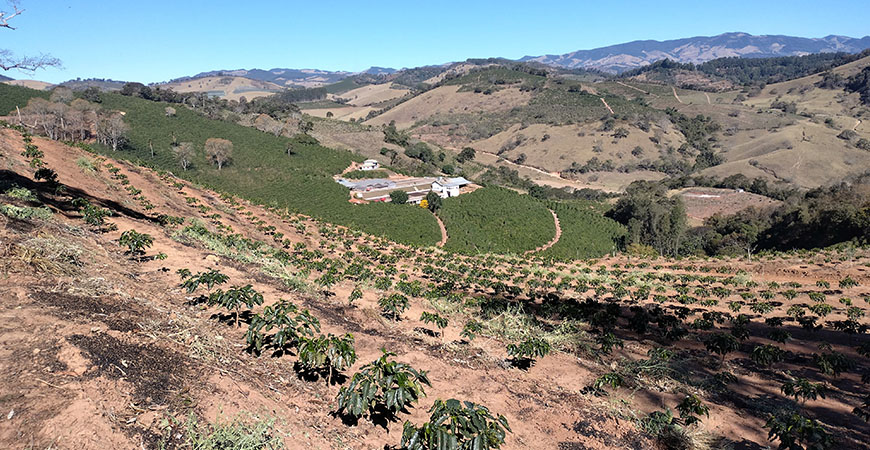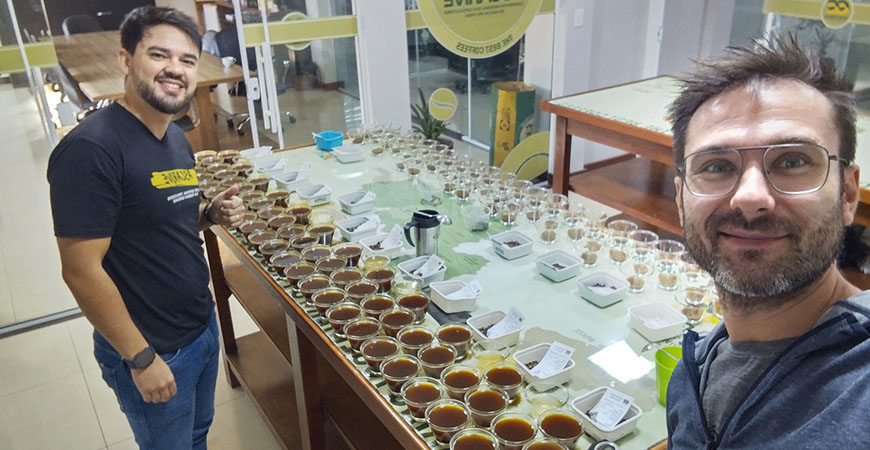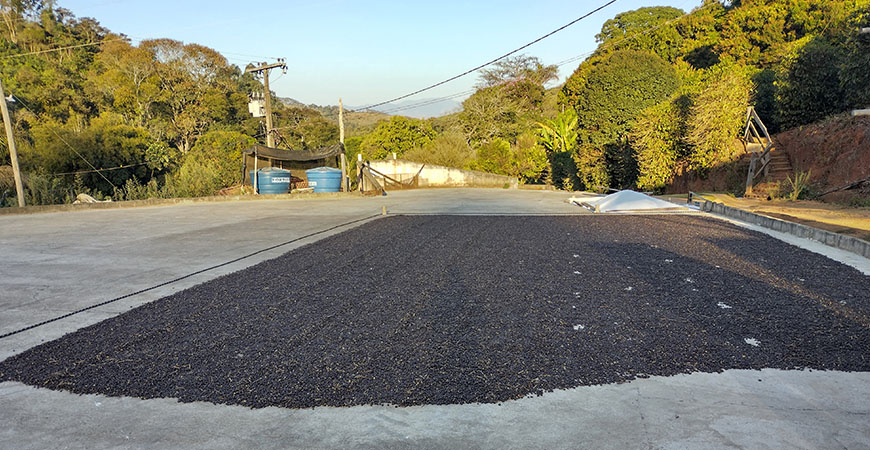- Free shipping in NL from €45
- Order before 12 PM, shipped same business day
- International shipping

An inside look at the Brazilian Fazenda Sao Francisco Bela Vista

A huge amount of coffee is grown in Brazil. The country is the largest coffee producer in the world. At 59 million 60-kilo bales, the last harvest was a lot higher than the previous harvest. So you would say: plenty of coffee. But Brazil is now also experiencing a major drought. There has been 60% less rainfall. That drought is disrupting the development of the coffee bushes and berries for the upcoming harvest.
Our buyer (and quality controller) Rick visited the Sao Francisco Bela Vista Fazenda over a month ago. ("fazenda" means farm). This coffee plantation is where our Brazil Santos Espresso is grown. And here, too, the effects of the drought are very apparent.
The purpose of this trip for BOOT is to get an up-to-date picture of how quality and sustainability are being promoted. Of course, we will also be there to taste some lots from the new harvest.
The fazenda was purchased by Tarcizio Zugliani more than 30 years ago. He started a large number of improvements to produce specialty coffee. Now, daughter Mara and son-in-law Clovis are the coffee managers and company directors. They work from the same philosophy of quality as their father (in law). Mother Dona Eunice, widow of Tarcizio, is the owner.
Rick was able to taste several lots of the new crop of "pulped natural" firsthand during an extensive cupping! From his notes, Rick enthusiastically lists, "Notes of soft acidity of yellow fruit, sometimes a little mango and orange. Chocolate notes, brown sugar and caramel and a balance in good body."
What's different at Bela Vista?
One thing became clear again during the extensive tour of farms and the surrounding landscape! This farm is much more compact and not so massive. Compared to other Brazilian factory coffee farms with endless almost industrial fields with only coffee bushes, it is a lot smaller. The area around Bela Vista is also more hilly and somewhat "wilder. Unlike the often flat and barren fields of the mass farm. This also makes it feel 'natural'.
The atmosphere at this fazenda feels 'authentic' and 'warm'. With those words, Rick describes what he feels in the atmosphere and encounters with employees. "There is not the most modern equipment, but I feel the charm of tradition and craftsmanship. A real family business."
Bela Vista has a small production. In total, it produces 600 bales of coffee. It is a true family plantation with 9 employees. 30% of the farm is an indigenous forest conservation area. Dozens of native trees, especially hardwoods, grow there, so many birds live there, such as the caracara, toucan and parrot.
More sustainable cultivation and production
The 1100 to 1200 meter altitude and location in Mantiquera de Minas is good for producing specialty coffee. There are still many older coffee bushes planted by father Tarcizio. Mara and Clovis are now continuing Tarcizio's philosophy of quality and sustainability. Not everything is already ideal. They are honest about it.
The weeds between coffee bushes are usually weeded by machine. Only when really necessary is controlled use of pesticides or herbicides used. You can also see this in the soil between the bushes, which looks more naturally overgrown than at many other plantations.
The farm has forests, bees, livestock and sustainable management, which complement each other to produce high-quality coffee. Separating and pulping the berries is done mechanically. There is a system for decanting the water used to wash the coffee. After this, the water can be reused to irrigate the sludge as organic fertilizer. The farm is fully powered by solar panels. 
Drying is done by burning "parchment" and "cáscaras" and on drying beds where the sun does its work. Thus, no fossil fuels are used.
The Fazenda Sao Francisco Bela Vista is distinguished by its small-scale, sustainable approach and the family business that has been working on quality coffee for generations. Just as BOOT Coffee strives to do as a coffee roaster. Taste the result of our beautiful collaboration back in the Brazil Santos Espresso.
-
Horecava - Jan. 13 to 16 - RAI Amsterdam Jan 9, 2025
-
Cold autumn days, warm up with good coffee Nov 13, 2024
-
Vacancy Trainer Workshops Nov 12, 2024
- horecava
- 2025
- boat
- coffee
- state
- hospitality
- entrepreneur
- Specialty Coffee Association
- SCA
- Coffee Concepts
- arabica
- quality
- flavor
- autumn
- intense
- java
- indonesia
- espresso
- warm tastes
- coffee experience
- speculoos show
- coffee autumn
- specialty coffee
- coffee moment
- coffee enjoyment
- artisanal coffee
- coffee inspiration
- boat coffee
- barista trainer
- coffee professional
- give workshops
- latte art
- coffee tasting
- Boot Koffie
- Amersfoort
- sustainable coffee
- hospitality support
- passion for coffee
- geisha
- gesha
- coffee type
- ethiopia
- panama
- colombia
- willemboot
- famous
- Ethiopian coffee
- panamanian coffee
- gesha origin
- coffee auctions
- hacienda la esmeralda
- quality coffee
- coffee designation
- Colombia La Laguna Geisha Organic - Limited Edition
- live
- roasting
- samples
- tasting
- burn
- cupping
- baarn
- store
- barista
- limited
- amersfoort
- local
- the classroom
- birdsong
- hartmann
- October
- araceli
- coffee of the month
- flat white
- brazil
- brazilian
- fazenda
- sao
- francisco
- bela
- vista
- coffee journey
- rick
- buyer
- drought
- price
- win
- jura
- stanley
- ktc
- happiness
- win
- espresso machine
- winners
- won
- discount
- organic
- filter
- pezzetti
- espresso jug
- filter coffee
- aeropress
- processing
- processing methods
- unwashed
- natural
- sustainable
- washed taste tones
- semi-washed
- washed
- honey
- processed
- blog
- kachalu
- decaf
- decaffeinated
- coffee farmer
- recepet
- instructions
- alejandro
- stable press
- team
- trainer
- business
- edition
- mesh
- premium
- caturra
- maragogype
- sumatra
- kopepi ketiara medan
- fair trade coffee sumatra
- organic coffee
- ketiara coffee cooperative
- hutan project sumatra
- sustainable coffee production
- esther
- indonesia
- blawan
- jampit
- shopping
- especially
- trial day
- organic
- home barista
- happinessflavor
- barend
- barendboot
- owner
- bio
- demonstration
- summer
- 84+
- grinding degree
- iced coffee
- panamaria
- koyner
- bunnik
- field kitchen
- food
- drink
- location
- bakery
- vegetable garden
- harvest table
- eko
- blend
- full body
- guts
- municipality
- ondernemen
- durable
- markroell
- mayor
- eemland
- nmvh
- dutch
- society
- industry
- trade
- Espresso
- Filter
- Panama
- coffee plantation
- acf
- amsterdam
- coffee
- festival
- acf2023
- event
- stock exchange
- gas plant
- westgas
- brazil
- coffee grinder
- ratio
- lead time
- month
- santos
- brasil
- times
- vincent
- van dijk
- representative
- resale
- stores
- ricardo
- boquete
- panamese coffee
- rickmaas
- kotowa
- grow
- dry
- select
- trip
- cooperativa
- caficultores
- santander
- rainforrest
- alliance
- tuyettran
- togo
- cups
- wecup
- waste
- litter-free
- re-use
- throwdown
- latte
- art
- milking
- February
- darja
- sexton
- director
- ethiopia
- odin
- organic
- magazine
- interview
- sommelier
- origin
- personal
- exotic
- taste profiles
- experience
- story
- Flavors
- trendy
- trends
- coffee trends
- green
- begin
- 2024
- coffee-of-the-month
- pacamara
- yeast
- yeast
- fermentation
- donjuan
- juan
- fermentation method
- agronomic
- family
- plantation
- administration
- webshop
- lungo
- Indonesia
- Sumatra
- Intense
- Women
- 50
- year
- reunion
- reunion
- the golden coffee box
- employees
- sinterklaas
- December
- piet
- poem
- ode
- spicy
- highly recommended
- nose
- burners
- roastery
- cupping
- perfection
- specialty
- finquita
- shiva
- not
- coffee roaster
- burner
- professional
- manager
- warehouse
- roast
- pro
- skal
- darkroast
- mystery
- smoky
- arnout
- decaffeinated
- quick
- quickmill
- machine day
- machine
- 820
- put
- employee
- store manager
- joukevink
- jouke
- finch
- lovebebber
- passion
- craft
- 50 years
- anniversary
- party
- coffee shop
- action
- quick mill
- hello
- dennis
- from
- will
- events
- account manager
- sales
- sales division
- office
- true
- brazil
- exciting
- travel
- lennard
- woerig
- elwaydesigns
- webdesign
- marketing
- designer
- enthusiast
- boat coffee game
- winner
- specialtycoffee
- Ethiopia
- AeroPress
- Hand Mill
- Outdoor Living
- Filter Coffee
- koffievdmonth
- coffees
- change
- coffee price
- increase
- Fair
- CO2
- costs
- radio
- m
- utrecht
- momoto
- wine
- whiskey
- litchi
- show
- dekoffeeshow
- music
- stories
- experienced
- vocals
- tell
- corazon
- dirkjan
- article
- gooieemlander
- present
- past
- future
- duration case
- goldencoffeebox
- avenue street
- baarnschecourant
- misset
- restaurant
- catering kitchen
- serve coffee
- cooking and cooking techniques
- boat coffee
- capriole
- chocolate
- coffee roasting
- move
- coffee production
- Brazil
- Mantiqueira de Minas
- quantity
- Brazil Santos
- Boat
- top
- two
- coffee dinner
- theLocal
- café
- denhaag
- capsules
- cups
- nespresso
- cup
- nice
- enjoy
- coffee brewing
- ultra
- heirlloom
- panama birdsong
- coffee bushes
- rainforest
- finca hartmann
- best of panama
- misset catering price
- recipe
- cereal drink
- coffee capsules
- coffee substitute
- deforestation
- climate neutral
- caffeine
- decaf
- natural
- certified
- tamp
- baristas
- profession
- box
- master
- moccamaster
- coffee game
- announcement
- filter machine
- tableware
- filters
- cafe
- dirk-jan
- leather
- bestofpanama
- ratibor
- tessie
- winner
- price
- award
- taste
- CSR
- futureproof
- collective
- rainforest
- discount
- action
- actions
- actions
- bonus
- affordable
- prices
- sunshine
- tastiest
- most beautiful
- mexico
- AMS
- climate
- neutral
- press release
- emissions
- carbon
- footprint
- environmental impact
- climate impact
- CO2
- acf2022
- cabra
- yemen
- gourmet
- corona
- conditions
- web store
- order
- Buy
- covid19
- Opened
- changes
- coffee farmers
- price increase
- fairtrade
- amsterdome
- theather
- dragan
- bakema
- draganbakema
- nk blind tests
- soesterberg
- fanciers
- sommeliers
- Kontakt der Kontinenten
- fred nijhuis
- cooperative
- discovered
- kaldi
- legends
- fruits
- monks
- mocha
- qahwa
- coffee shops
- July
- harvest
- new
- organic
- soccer
- uk
- elf
- cold drip
- ride
- bicycle tour
- bunschoten
- scuderia
- lamarzocco
- marzocco
- coffee bean
- life
- sustainability
- coffee grounds
- scrub
- compost
- hands
- her
- skin
- odors
- recycle
- entrepreneurs
- actor
- coffee happiness
- sponsor
- sponsorship
- convenience
- tips
- brewing tips
- milk
- foaming
- Froth
- latte-art
- home
- video
- beginner
- hearts
- flowers
- advanced
- cafetiere
- push pot
- frenchpress
- slowcoffee
- grinding
- brewing instructions
- save
- coffee storage
- how long
- organic coffee
- store brewed coffee
- panamanian
- single estate
- happiness by taste
- trialand-er
- maria
- ruiz
- michiel
- slaats
- coffee song
- smell the bush
- test different
- piano
- trumpet
- milk frother
- Brazil
- Nicaragua
- Ethiopia
- espresso coffee
- pananama
- Tea types
- cocoa
- ktc35
- coffee for peace
- epsresso
- cold
- brew
- coldbrew
- ice
- beverage
- serving tip
- cocktail
- espressions
- work
- manual-filter-coffee-making
- sachets
- ese
- serving
- pads
- fantastic
- fiter
- make the best coffee
- Workshops
- tastings
- temperature
- amount
- warming up
- Amsterdam Coffee Festival
- Is coffee healthy
- is coffee good for you
- how healthy is coffee
- how many cups of coffee per day
- is decaffeinated coffee healthier
- is filter coffee healthier than espresso
- beans
- coffee countries
- countries
- healthy
- cafetière
- scoops
- healthier
- support
- local
- coffeetogo
- the price ofmycoffee
- book
- fair price
- fair coffee
- mission
- acf2020
- socialimpact
- percolator
- coffee cup
- coffee pod
- piston
- sustainablecoffee
- what's the money in coffee
- sustainablecoffee
- did you know
- whatyouneed to know aboutcoffee
- crowdaboutnow
- crowdfunding
- threatened
- low
- revenue
- wedding
- prizewinner
- missethoreca
- finca
- coffee cocoa
- hotspot
- coffee room
- vegan
- conscious
- delights
- smoothies
- acai
- heleenvanroyen
- heleen
- royen
- coffee diary
- coffee school
- hilversum
- plant
- berries
- coffee plant
- harvest
- launch
- coffee orders
- buy coffee beans
- npo3
- inspection service
- inspection of value
- marin frank
- barend boot
- July 11
- TV
- broadcast
- visit
- prideofthailand
- thailand
- thai
- coffee prices
- costa rica
- guatemala
- el Salvador
- honduras
- nicaragua
- fair trade
- middle america
- south america
- conversation
- nk
- blind tests
- fd



